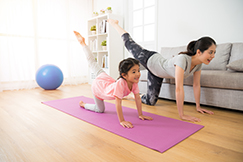NCD Watch
Stay Home and Be Healthy
27 Apr 2020 (Mon)
 In the wake of the coronavirus disease 2019 (COVID-19) pandemic, the Government of Hong Kong SAR strongly urges the general public to go out less and reduce social activities and maintain an appropriate social distance with other people as far as possible. When staying home for a prolonged period due to various reasons e.g. work from home, learning at home, home quarantine etc., some individuals may feel bored, lonely or even anxious and then resort to frequent snacking with energy-dense processed foods or sugar-rich beverages, spending hours sitting and watching television or videos, indulging in Internet activities or playing on-line games. After a week or two, they are very likely to have unhealthy weight gain as consequences of self-indulgence, overeating and physical inactivity. Research has clearly showed that overweight and obesity is linked to increased risk of many non-communicable diseases, including heart disease, stroke, type 2 diabetes and some cancers such as colorectal cancer and breast cancer. Prolonged sitting can also compromise metabolic health, cause deep vein thrombosis and lead to muscle stiffness or back pain. To stay physically and mentally fit while staying at home, it is utmost important to eat healthily and be physically active.
In the wake of the coronavirus disease 2019 (COVID-19) pandemic, the Government of Hong Kong SAR strongly urges the general public to go out less and reduce social activities and maintain an appropriate social distance with other people as far as possible. When staying home for a prolonged period due to various reasons e.g. work from home, learning at home, home quarantine etc., some individuals may feel bored, lonely or even anxious and then resort to frequent snacking with energy-dense processed foods or sugar-rich beverages, spending hours sitting and watching television or videos, indulging in Internet activities or playing on-line games. After a week or two, they are very likely to have unhealthy weight gain as consequences of self-indulgence, overeating and physical inactivity. Research has clearly showed that overweight and obesity is linked to increased risk of many non-communicable diseases, including heart disease, stroke, type 2 diabetes and some cancers such as colorectal cancer and breast cancer. Prolonged sitting can also compromise metabolic health, cause deep vein thrombosis and lead to muscle stiffness or back pain. To stay physically and mentally fit while staying at home, it is utmost important to eat healthily and be physically active.
A healthy diet is vital to physical health, mental health and the immune system. Therefore, people are recommended to eat according to the “Healthy Eating Food Pyramid” guide and observe the basic principles of healthy eating: reduce sodium/salt intake, limit sugars consumption, limit fats intake, eat more fruit and vegetables, consume enough dietary fibre, drink enough water. Of note, members of the public should not resort to alcohol drinking as a way to beat boredom or stress, and misbelieve that alcohol drinking can protect them against COVID-19.
Physical activity is good for both physical and mental health. It not only prevents weight gain and reduces the risk of various obesity-related diseases, but also boosts immunity and helps reduce stress and anxiety. For optimal health, the World Health Organization (WHO) recommends adults to engage in at least 150 minutes of moderate-intensity physical activity or equivalent amount per week and do muscle-strengthening activities involving major muscle groups on two or more days a week. Children and adolescents aged 5–17 should do at least 60 minutes of moderate- to vigorous-intensity physical activity daily and include activities that strengthen muscle and bone at least 3 times per week. In addition to physical activity participation, members of the public are also advised to limit prolonged static sitting. As opposed to sitting, simply standing up would engage muscles and enable body metabolise fat in a healthy way.
While staying home and temporary closure of sports facilities, members of the public may perceive that it is difficult to maintain physically active. In fact, WHO recommendations on physical activity can be achieved at home with limited space, with no special sporting equipment and without going to gymnastics room, and with bouts of mini-workout (10 or 15 minutes) accumulated throughout the day.
Below are some tips on how to stay physically active and reduce sedentary behaviour while at home —
- Do home-based exercises or dance with music;
- Do household chores. Maintaining environmental hygiene is one of the keys to personal protection against infection and prevention of the spread of the disease in the community. Moderate-intensity home activities include sweeping floor, wiping windows, scrubbing bathroom or bathtub with some efforts;
- Engage in some physical activities while watching television, such as squat, lunge, stepping on the spot or stretching exercise;
- Be aware of screen time and take regular breaks from on-screen activities;
- While videogames can be a way to relax, be sure to have a balance of activities in daily life and choose playing active videogames.
To empower members of the public to do more physical activities, the Department of Health (DH) produced a number of demonstration videos for different settings, including the Household Fitness Dance that can be viewed at www.change4health.gov.hk/en/resources/av_gallery .






































